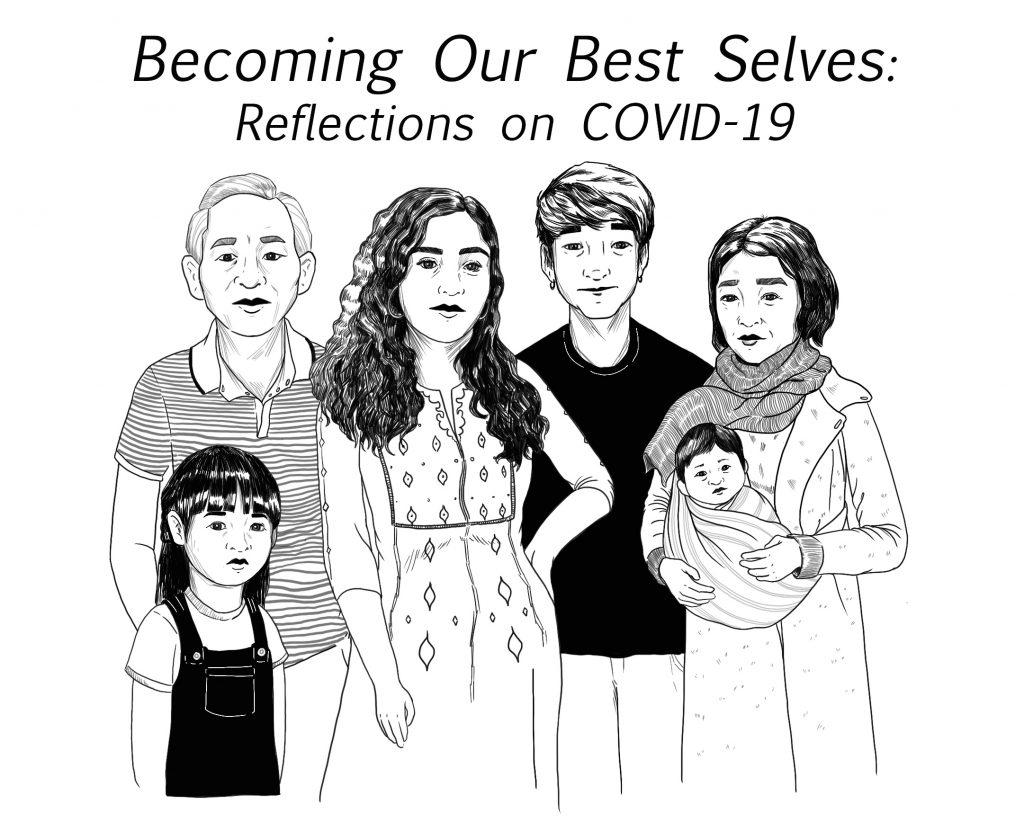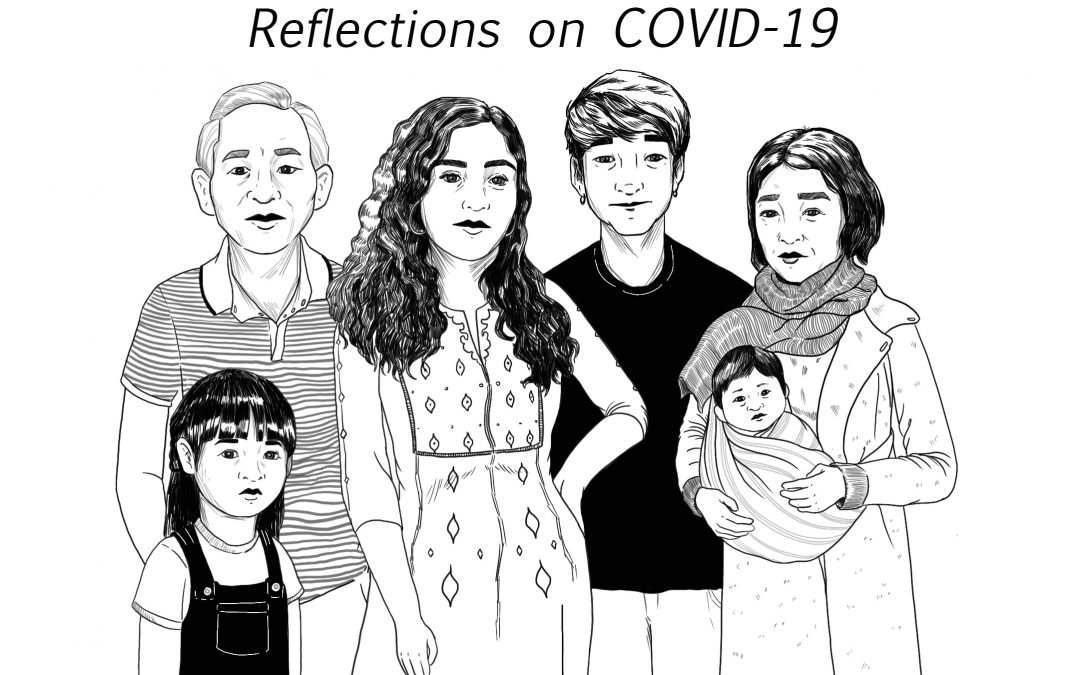
This past week, week three of our shelter-in-place, I went for a walk in the nearby conservation land. Though it has become much more popular since the threat of COVID-19 has eliminated most normal recreational activities, it’s by no means crowded. Which is why what happened next surprised me.
I was plodding along with our pokey dog, crying on and off (we had just received news that a friend passed away from the virus), and looked up to see a family coming around the corner less than ten feet away. The father audibly gasped and pulled his five- or six-year-old daughter close to him as I passed. The perception that I was a potential threat to his health and wellbeing stung. And then it hit me.
This is what People of Color experience ALL THE TIME.
It happens when a white person chooses to cross the street rather than share the sidewalk with a group of Latinos. It happens when a white person reflexively locks the car doors at a stop-light in a black neighborhood. It happens when a white person gets up and changes seats on a crowded subway when a Black or Asian person sits next to them. It happens when the white clerk at the department store refuses to make eye contact with the elderly Indian gentleman and refers to him as a boy. It happens all the time. (And yes, Blacks can exhibit racism against Asians, and Asians can exhibit racism against other Asians, etc. I’m sharing these examples because I personally observed them in the greater Boston area during the recent past.)
Believing yourself to be better than someone simply because of skin color is an ancient and nefarious practice. It’s not specific to the United States though we have been guilty of practicing and institutionalizing systemic racism for a long, long time. When the northern European settlers arrived on the East Coast of what is now America, they deemed that it was manifest destiny and their god-given right to take the land that was inhabited by Native Americans—whom they concluded to be inferior—and do whatever they wanted with it. That this directly opposed the fundamental truths of Scripture which most of them claimed to believe, apparently did not trouble them.
This belief system continued as white settlers made fortunes on the backs of black and brown women, men, and children. Based on many metrics (including disproportionate incarceration of Blacks, police brutality against Blacks, withholding of resources to Black school districts), dehumanizing and degrading treatment of Black people is still normative in our country.
As COVID-19 has spread across the globe, anger and violence has been directed toward members of the Asian-American community. According to a recent report, Asian Americans experienced more than 650 acts of violence and racial discrimination. In one week. These included verbal bullying, punching and shoving, and tragically, even several knife attacks.
While President Trump’s choice to refer to COVID-19 as “the Chinese virus” in a press conference several weeks ago surely fanned the flames of racism, ani-immigrant/anti-Asian sentiment predates his election. As recently as 1992, Korean Americans were on the receiving end of hate crimes and extreme violence during the Los Angeles riots. (If you need more proof, there’s always the World War II internment camps.)
The why of our nation’s racism is complicated and multi-layered. If we dig down, we can discover roots of greed and fear. Greed and fear propagate idolatrous beliefs and practices. (See last week’s post for more.) Idolatrous beliefs and practices then foment all kinds of broken, dishonoring cultural norms and eventually, laws.
Let me try to unpack that. Americans, specifically white Americans, tend to value individualism over community. We’re more inclined to make choices that benefit our individual family unit even if it costs our community. For instance, after the announcement about sheltering-in-place, buying enough toilet paper for two months even if that meant your next door neighbor might find empty shelves when they came later in the day. (That’s obviously a purely hypothetical example.) Individual rights are good—especially when they are extended to all people. But valuing individual rights over the collective health of the whole can result in policies and practices that exclude or disadvantage entire swaths of people.
We have also esteemed capitalism and the promise of wealth over human life. How else can we explain, let alone justify, more than two hundred years of slavery? Any potential threat (real or imagined) to capitalism results in scapegoating and blaming. We can see this in the strong anti-immigration sentiment (which is ironic given that without the hard-working immigrants and seasonal laborers from Central American, the capitalistic system may very well fall apart) as well as the current acts of racism against Asian-Americans. It’s somehow easier to think It’s their fault that the virus has invaded our land and threatened our lives than it is to roll up our sleeves and solve the problem. Such responses are as juvenile as they are illogical. They are also based in a scarcity mentality; the idea that if we share our bountiful resources with others (like the Native Americans did with the Pilgrims), we won’t have enough. If it’s not obvious, this is greed. Something that Jesus consistently condemns. (Read the gospels for more.)
Mature, God-fearing adults (who I’m hoping to address here) should be willing to admit and part company with any forms of idolatry that exist in their lives. One of the ways this happens is through developing empathy—being willing to see and experience life through the eyes of someone who is different from you. That’s what the moment on my walk last week was all about. Rather than simply rolling my eyes or silently cursing the father for his reaction, I allowed myself to feel something that was outside of my own experience. Empathy should then help us to go out of our way to protect our brothers and sisters of color. That might mean intervening when you see acts of racism or hear racist slurs being uttered. It could also mean confronting leaders and authority figures when they downplay or ignore racism in their midst.
The COVID-19 pandemic is offering us an opportunity. Situations of this type (and, for example, the disaster of 9/11) tend to bring out the best and worst in us. We see many examples of phenomenal sacrifice and love. Unfortunately, we also bear witness to unfathomable acts of violence and hatred. My hope and prayer is that as we work together to eradicate COVID-19 from our shores, we will be just as determined to rid our country of racism.
Peace.
For further reading/listening:
April Yamasaki over at Patheos.
Grace P. Cho at (in)courage.
Andre Henry on his blog.
Sheila Wise Rowe’s phenomenal book Healing Racial Trauma.
And please read and consider singing this important document written by the Asian American Christian Collaborative.
Good News. I am hoping to list three or four articles that are humorous or encouraging during this horrific season. If you only have 2 minutes, click this link. Skip over the first YouTube and go directly to Tom vs Tree and then the remaining short beats.
Local farmers, who work exceedingly long hours and often make vey little money, have been stepping up to make sure we don’t go hungry. I’m so grateful.
Watch this family’s shelter-in-place inspired parody of Les Mis.
And finally, this moving story of how Robert Kraft’s family (of NE Patriot fame) partnered with MA Gov. Charlie Baker to get masks from China to Boston for our medical personnel. Even Baker, who rarely shows any emotion, got choked up. I am praying that more pro sport teams and billionaires choose to show this kind of generosity.
Predictions:
#1 We’re going to have enough toilet paper. It’s the masks and the protective gear needed by doctors and nurses that we should be worrying (and praying) about.
#2 Many of us are going to need therapy after this. (I’m so not kidding.)
#3 We are going to be discovering which embedded practices and habits are useful and which ones we can let go. This also applies to businesses and churches. (More on this in a later blog.)
#4 This is going to move us to a more local economy.
Remember to check out my forth-coming book, Marriage in the Middle. It’s available for pre-order now. Also, my husband and I are going to be doing our 2nd Counseling for Quarantined Couples on Facebook Live, this Wed. at 8PM.
Awesome illustration above: Tristan Cabral, a Filipino-American artist living in the Los Angeles area
Title: We are not the virus.
Instagram Handle: @OhTristan
From the artist: “This illustration depicts six Asian-Americans look straight at you, the viewer. A Taiwanese-American man. A Filipino-American girl. An Indian-American woman. A Korean-American man. A Japanese-American woman and her baby. I want the viewer to be stopped by the gaze of each of these people as individuals as well as a collective group. Each of them have a story, value, and lessons we can learn from. They are not to be feared but loved just as the viewer is not to be feared but loved as well.”
Stay well.
